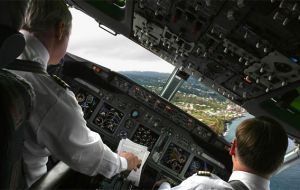MercoPress. South Atlantic News Agency
World airlines 'face $9bn loss'
 Iata says the environment now is worse than the period after 9/11 for airlines
Iata says the environment now is worse than the period after 9/11 for airlines The global airline industry has nearly doubled its expected losses for the year to $9bn amid what it calls an unprecedented crisis.
Giovanni Bisignani, the head of the International Air Transport Association (Iata), told the group's annual meeting last week that the impact of the global economic crisis on the industry was worse than that of the September 11, 2001 attacks in the US.
“There is no modern precedent for today's economic meltdown. The ground has shifted. Our industry has been shaken,” Bisignani said in a speech to industry leaders at the meeting in Kuala Lumpur. “This is the most difficult situation that the industry has faced.”
The estimated $9bn is almost double the $4.7bn loss that Iata had forecast in March.
The group represents about 230 airlines that make up 93 per cent of scheduled international air traffic.
Iata also revised its loss estimate for 2008 to $10.4bn from its previous estimate of $8.5bn.
Massive losses
According to Bisignani, in the aftermath of the 2001 attacks, global airline revenues declined by seven per cent and it took three years for the industry to recover despite a strong global economy.
“This time we face a 15 per cent drop - a loss of revenues of $80bn - in the middle of a global recession,” he said.
“Our future depends on a drastic reshaping by partners, governments and industry.”
The airline industry has been among the worst hit by the economic crisis, which struck in the third quarter of last year, as demand for air travel around the globe has plummeted.
In the Asia-Pacific region, the Japan Airlines Corporation (JAL) plans to reduce its capacity on international routes by 10 per cent for the 2010 fiscal year, its chief said on Monday.
Haruka Nishimatsu also told the Reuters news agency that JAL, which is Asia's biggest carrier by revenue, had not yet decided on whether to accept a multi-billion dollar government emergency loan.
The Nikkei business daily reported last week that a syndicate of Japan's three biggest banks as well as the state-owned Development Bank of Japan were planning to lend about $1bn to JAL as early as this month.
Fuel factor
Moody's, a ratings agency, said in a report that the effect of the recession on demand for travel will have more of an impact on airlines' revenue than the rising cost of fuel throughout this year and 2010.
However, Bisignani noted that despite a drop in oil prices, “the slightest glimmer of economic hope sends oil prices higher”.
“Greedy speculation must not hold the global economy hostage. Failure to act by governments would be irresponsible,” he said.
Iata says the airline industry fuel bill is forecast to decline by $59bn to $106bn in 2009, accounting for 23 per cent of operating costs with an average price of oil currently at $56 a barrel.
By comparison, the 2008 fuel bill was $165bn, accounting for 31 per cent of costs at an average price of $99 a barrel.
The gloomy outlook however, has not seemed to effect profitability in Qatar's airline industry.
Akbar al-Baker, the chief executive of Qatar Airways, said the state-owned airline was expected to make a profit of at least $100m this financial year.
Al-Baker also said the airline, which has about $27bn worth of planes on order, wants deliveries to be speeded up.
Qatar has about 200 planes on order from US firm Boeing and European rival Airbus. Agencies




Top Comments
Disclaimer & comment rulesCommenting for this story is now closed.
If you have a Facebook account, become a fan and comment on our Facebook Page!